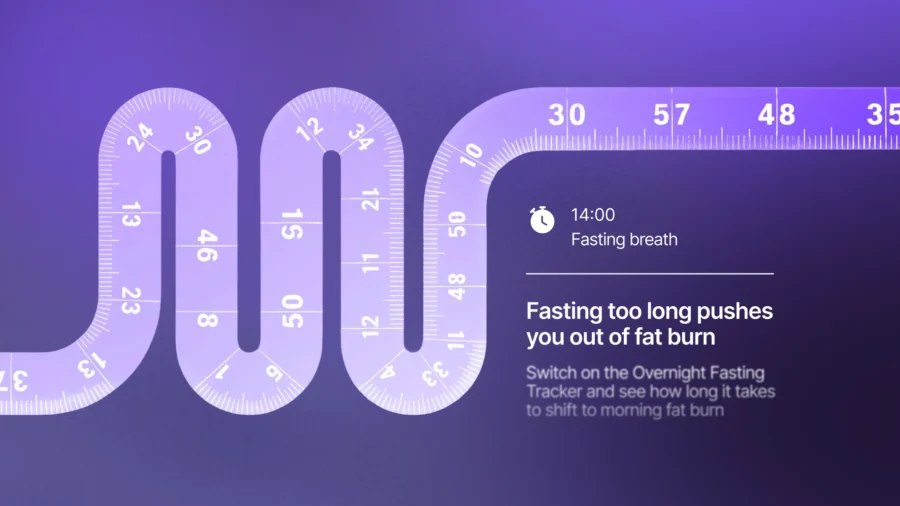Why am I not losing weight?

What happens when you do all the right things but nothing works?
You’ve decided to meal prep and start a new diet. You’re eating in a calorie deficit and hitting the gym more often. However, the numbers on the scale aren’t budging. Or, perhaps, you haven’t been able to keep the weight you lost off.
If this is your experience, you’re not alone. Many struggle to reach their weight management goals despite following nutritional advice and exercise routines. In a meta-analysis of 29 long-term weight loss studies, more than half of lost weight was regained within two years, and by five years more than 80% of lost weight was regained1. This is because we tend to focus on short-term dietary restrictions, not the mechanism behind how we process food and turn it into energy for our body to use.
The truth is that shedding stubborn pounds boils down to more than just being in a caloric deficit or adding exercise to your daily routine. Ultimately, there’s more going on in our bodies than we know, and many people are unaware that a huge part of weight loss comes down to metabolic flexibility.
Understanding the inner workings of metabolic flexibility is understanding the foundations of your health. It is life-changing and will help you get to the root cause of your weight loss challenges.
“Lumen has helped me get through my menopause stubborn weight plateau. Nothing was working, but Lumen helped me adjust my eating and exercise to help my body work efficiently. In just one month, I’ve lost 13 lbs!”
Marlene, Lumen user
What is metabolic flexibility?
Before we can dive into metabolic flexibility, we need to talk about mitochondria. While many of us haven’t dedicated much thought to our mitochondria since high school biology class, they are crucial to our well-being. Mitochondria, also known as the powerhouses of our cells, turn the food we eat into the energy that powers us through the day. The health of your mitochondria plays a significant role in determining metabolic flexibility2 and promoting healthy weight loss.
Metabolic flexibility is the mitochondria’s ability to adapt and transition between burning fats and carbs for energy based on what is available and the body’s energy demands3.
For example, if you eat carbs as part of your meal, your mitochondria will focus on burning the carbohydrates you consume. In a couple of hours, they will shift gears and burn fats. Being metabolically flexible allows your body to oscillate smoothly between burning these macronutrients according to energy demand.
Metabolic inflexibility, on the other hand, is when your mitochondria cannot easily make this transition. As a result, the body’s ability to burn fat in the resting or fasted state is reduced and excess carbs are more likely to be stored as fat, leading to fatty acid accumulation24. Reduced metabolic flexibility is also associated with obesity, diabetes, and cardiovascular disease5.
Fortunately, you can finetune your metabolic flexibility so your mitochondria favor burning fat more often and rely on fat burn at rest. That’s the beauty of metabolic flexibility — it’s not a diet, it’s all about adjusting your personal physiology to make weight loss and maintenance easier.
In order to efficiently switch between fuel sources, your mitochondria have to be both plentiful and healthy. You can impact your mitochondrial health through your lifestyle. It’s not just about what you eat, but also exercise, sleep, and stress management. Your lifestyle choices affect core elements in your body which impact your mitochondria. Below, we’ll take a look at some commonly overlooked strategies to improve mitochondrial health and shift to easier weight loss.
”I think that anybody can do this. If I can do it after four years of not losing weight, only gaining weight, and then finding Lumen and losing 42 pounds—I am just amazed at what my body has been capable of doing.”
Stephanie (Lumen User), 42, Ohio
Your toolbox for healthy weight loss
See the results from users who chose Lumen’s “healthy weight loss” track >>>

These are some tips for improving your metabolic flexibility and mitochondrial function to promote healthy weight loss:
Focus on macronutrients, not just calories
Not every diet, particularly a highly restrictive one, is healthy or sustainable in the long run. Research shows that diets with varying macronutrient compositions affect mitochondria production, health, and function differently6.
Macronutrients are the composition of carbs, proteins, and fats in your meals. Consuming these macros in the right quantity adjusted to your goals and body composition can help boost your metabolic flexibility.
Macronutrient balance is essential for regulating glycogen, the storage form of carbohydrates your body doesn’t use immediately. Low (but not too low) glycogen levels trigger fat burn and mitochondrial reproduction, so if you constantly consume more carbs than you need, your glycogen stores never empty enough to enable this critical process.
When you maintain healthy fluctuations in your glycogen levels by modifying your carb intake to align with your daily activity, you remain efficient at burning both fat and carbs, supporting you both at rest and during your most demanding days. You can balance glycogen stores through carb cycling and timing your carb consumption around your workouts and the energy you expend.
A mix of protein, carbs, and fats also helps manage your blood sugar levels. This prevents potential glucose spikes caused by eating carbohydrates on their own and balances insulin production. High insulin sensitivity means the body needs only a small amount of insulin to help glucose enter the cells. This efficient glucose uptake supports your cells’ metabolic functions, ensuring they have enough energy for daily activities. Lower insulin secretion is also associated with weight loss and appetite modulation7.
“A macro-based diet allows each of us to harness the power and potential of our metabolism in our journey to our health goals.”
Dr. Michal Mor, PhD

Opt for weightlifting
Muscle mass is not only a reflection of physical strength, it plays a role in your metabolism. This is because muscles are packed with mitochondria. More muscle means more mitochondria, increased fat burn at rest, and a quick shift to carb burn when you need a boost.
Another form of exercise that can help with weight management is high-intensity interval training (HIIT). Studies show that it can effectively promote fat loss and encourage weight loss8. With a HIIT workout, your body will likely burn through its glycogen stores to fuel the workout and, ideally, burn fat not long afterward.
Manage stress levels
Long-term stress can cause changes in eating habits and fat storage, making it difficult to lose weight9. Cortisol, also known as the stress hormone, tells your mitochondria to switch to carbs for a quick power boost. This short-term spike is healthy and normal — it’s what helps you ace exams and power through your workouts.
But chronic stress can keep cortisol levels constantly elevated. This overworks your mitochondria, damaging their membranes and reducing their lifespan. It also makes your mitochondria overdependent on carbs for fuel. Over time, they forget how to burn fat. You can face this head-on by adding stress-relief habits and activities into your daily life, such as journaling, yoga, or mindfulness meditation.

Improve your sleep hygiene
Researchers have found that sleep helps reduce oxidative damage and stress in the mitochondria, thereby preserving mitochondrial health. A lack of quality sleep does the opposite: it increases damage to the mitochondria10 and negatively impacts metabolic flexibility.
Sleep is regulated by your internal clock, which lets your body know when to work and rest. Late-night screen time or heavy dinners before bed can take you out of sync with the daily rhythm. Confused by an out-of-sync body clock, your mitochondria work overtime and have less time for self-repair. This can cause you to wake up in a state of carb burn, a sign that your mitochondria are not well-rested.
Creating a healthy bedroom environment can improve your sleep quality. Ensure your bedroom is dark and cool at night, and keep your electronic devices off or muted. Having a regular sleep schedule can also be beneficial.
When your mitochondria have time for maintenance, repair, and reproduction during sleep, you are more likely to wake up in fat burn. In other words, your body is spending more time burning fat, making it easier to manage weight.
Jumpstart your weight loss with improved metabolic flexibility
If you’ve followed a restrictive diet, been in a prolonged calorie deficit, overtrained at the gym, and yo-yo dieted without seeing much weight loss, it might be time to dig deeper into your metabolic flexibility. By tracking and monitoring your mitochondrial efficiency as you make lifestyle modifications, you can better understand what impacts your unique metabolism.
“Knowing whether your body is burning fat or burning carbs is a process called biofeedback. If you don’t know if you’re doing things right or wrong, you’re never going to improve.”
Dr. Jason Fung, MD
Lumen was created to make metabolic flexibility easier to track and improve by pinpointing whether your body is burning carbs or fats for fuel. It enables you to follow your progress, build healthier habits, and achieve your weight loss goals. Once your measurements are analyzed, Lumen can determine your metabolic flexibility and provide lifestyle recommendations and personalized insights about your metabolic health.
Healthy weight loss and body composition start with healthy foundations. Think of your metabolism as your ultimate partner, always working behind the scenes to keep you energized and thriving. Monitoring your biology and metabolism is so important because it means knowing what’s working or not for you and making adjustments to get higher returns.







 Digital download
Digital download 


